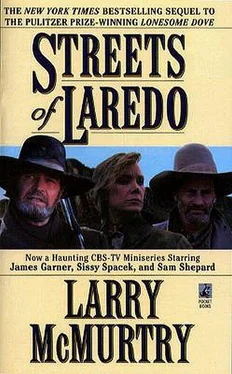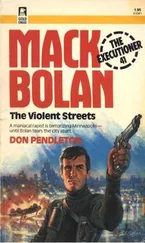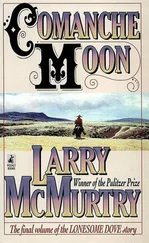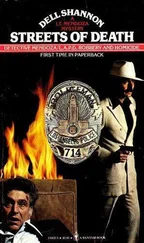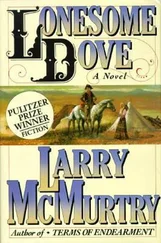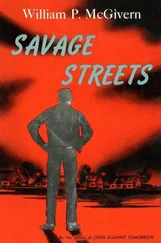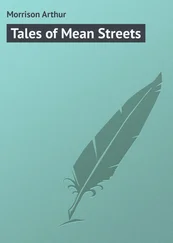"Were any of her husbands good to her?" Lorena wondered.
The two men were silent. They had known little of what went on in Maria's marriages. When she was with Roberto Sanchez, her face had often been bruised; apparently he was rough, though Maria had never mentioned it to either of them. Carlos Garza had been a vaquero, off in the cow camps with other vaqueros. Juan Castro had been cheap; besides her midwifing, Maria had done cleaning for white people across the river when she was married to him. Benito had merely been lazy; he seemed to have no malice in him.
But was Maria ever happy? Both could remember her smile, and the sound of her laughter, and the look on her face when she was pleased as well as when she was displeased. But was Maria ever happy? It was a hard question.
"She had her children," Billy replied. "She was good to her children." Lorena asked no more questions. She felt she had been foolish to inquire. The two men were probably decent, as men went. Both had clearly been devoted to Maria, else why would they be here, reluctant to leave her grave? But how the woman had felt when she closed the doors of her house at night and was alone with one of her husbands and her children, was not something that men could be expected to know. What Maria had felt in the years of her womanhood was lost. Who would know what feelings she had struggled with as she lost four husbands and raised her children? How could men, decent or not, know what made a woman happy or unhappy? She herself had known little happiness until she had persuaded Pea Eye to accept her. Why she felt she might be happy with Pea instead ofwith any of the other men who had sought her hand in the years after Gus McCrae's death was elusive, too. Lorena had thought she'd known what drew her to Pea Eye once, but now, sitting by the campfire in Mexico, she found she couldn't recover her own reckonings in the matter.
She had been right, though, for she had known great happiness with Pea Eye and their children. Probably there was no explaining any of it; probably it had been mostly luck.
The night grew colder, and the stars shone even more sharply in the deep, inky sky. Lorena drank most of the bottle of whiskey. She knew that she would feel like her head was cracking in the morning, but she didn't care. The restlessness she felt had to be conquered; the deep fear inside her had to be dulled. She needed the fire of the whiskey and the numbness that finally came.
Even with the whiskey in her, Lorena could not stop thinking of Maria. She wished she'd had more time with her, time not so filled with violence and pain. There had been no time for the talk of women when there had been so many injured to attend to. Then Maria had become one of the injured herself. She'd had to save her strength for her final request.
Maria's eyes, at the end, haunted Lorena. She wanted to forget Maria's eyes, but she also wanted to know what Maria knew and what she had felt. She wished the two of them could have had even one talk about their lives. She wished it very much, but that wish could not be granted.
The white line of dawn began to show in the east, across the river. Soon, Lorena knew, she would have to go in, drunk or not, rested or not, and start tending to the injured and the children. It was too late for the knowledge she craved; she would never know much about Maria.
That chance--an important one--had been lost forever.
The line of white to the east widened, and the lower stars began to fade. In that direction, only a few steps beyond where the goats were sleeping, Maria Sanchez lay buried, not far from the Rio Grande, in a narrow grave.
Call's greatest embarrassment was that he could not stand up and walk outside to relieve himself. For a time he had no crutch and would have been too weak to use one, even if one had been available. He had to make water in a jug, and often was too weak even to do that properly. He had only his left hand, and his finger joints were still swollen so badly with arthritis that he couldn't work his own buttons.
Mostly, Pea Eye helped him. But if Pea Eye was sleeping or had hobbled outside with Maria's children, Lorena came and assisted him matter-of-factly, ignoring his embarrassment and shame. She did it quickly, as she might have dipped water out of a bucket.
"We don't have the bedding to spare, Captain," she said once; it was her only comment on the matter.
At such times, Call wanted to take out his pocketknife and cut his own throat. But someone had taken his pocketknife, and even if he had had it, he doubted he could have made a clean job of it with only his left hand to use.
Call spoke only to the little blind girl, Teresa. She insisted on caring for him and he accepted her help, although sometimes her girlish chatter tired him. She was very helpful to him; also, she was a young child, and blind. She could not see his stumps, or the black bruise that covered most of his chest, where the bullet was that the doctor had not been bold enough to remove. Call wished the man had made an attempt; perhaps then he would have died.
At least Teresa couldn't see him, and she hadn't known him as he had been. She sat by him and fed him, and while she fed him, told him little stories about spiders and rabbits. Her speech was like a birdsong, quick and light. Hearing her voice was Call's only pleasure. He never reproached Teresa or sent her away, even when he was weary or hot with pain. In the mornings he waited patiently for her; as soon as she awoke, Teresa would come over and put her cool hand on Call's forehead to see how bad his fever was.
From the moment Joey Garza's three bullets struck, Call's only escape from pain had been unconsciousness. He clung to sleep, but his dozings became shorter and shorter. On the day he was wounded he had wanted to live; he wanted to finish the job he had been hired to do. He had never left a job unfinished in his life.
Remaining himself, remaining who he was, meant finishing the job he had undertaken.
But as Captain Call floated in and out of fever and hallucination, the first thought that filtered into his consciousness each time he awoke was a sense of irrevocable failure--a failure that could never be redeemed. He could not finish the job; would never finish or even undertake such a job again.
He had failed and was beyond making the failure good.
He deeply regretted not doing exactly what Gus McCrae had done: letting the wounds finish him. His wounds had finished him as the man he had been. He clung to a form of life; but a worthless form. He had never enjoyed letting people wait on him; he had always saddled his own horse, and unsaddled it too.
But now people waited on him all day. Teresa brought him food and spooned it into his mouth.
Lorena changed his bandages. Pea Eye, crippled himself, nonetheless had two hands and helped him into a clean shirt and fresh pants when the time came to change.
Call could not clear his mind sufficiently to bring what had happened into a clear sequence, or even to remember it all. He inquired about Brookshire and was told that his body had been taken to the undertaker's in Presidio, the day Lorena and Billy had gone to procure the coffins for Maria Sanchez and her son. It was still there, awaiting instructions. No one had had time to inform Colonel Terry of all that had occurred.
Some days, Call understood that he had killed Mox Mox; at other times, he thought Charles Goodnight had killed him--at least, Goodnight had been mentioned in connection with the death. He could not get the facts of Deputy Plunkert's demise straight in his mind, nor was it quite clear to him how Brookshire had died.
The confusion only made his sense of failure worse: two men who should never have been with him in the first place, who had been cajoled in!coming by Call's own misjudgments, were now dead. It was a sorry thing.
Читать дальше
